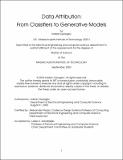| dc.contributor.advisor | Mądry, Aleksander | |
| dc.contributor.author | Georgiev, Kristian | |
| dc.date.accessioned | 2023-11-02T20:07:43Z | |
| dc.date.available | 2023-11-02T20:07:43Z | |
| dc.date.issued | 2023-09 | |
| dc.date.submitted | 2023-09-21T14:25:57.309Z | |
| dc.identifier.uri | https://hdl.handle.net/1721.1/152676 | |
| dc.description.abstract | The goal of data attribution is to trace model predictions back to training data. Despite a long line of work towards this goal, existing approaches to data attribution tend to force users to choose between computational tractability and efficacy. That is, computationally tractable methods can struggle with accurately attributing model predictions in non-convex settings (e.g., in the context of deep neural networks), while methods that are effective in such regimes require training thousands of models, which makes them impractical for large models or datasets. Moreover, existing methods are often tailored to the supervised learning setting, and are not well-defined for generative models.
In this thesis, we introduce TRAK (Tracing with the Randomly-projected After Kernel), a data attribution method that is both effective and computationally tractable for large-scale, differentiable models. In particular, by leveraging only a handful of trained models, TRAK can match the performance of attribution methods that require training thousands of models. We first demonstrate the utility of TRAK across various modalities and scales in the supervised setting: image classifiers trained on ImageNet, vision-language models (CLIP), and language models (BERT and mT5). Then, we extend TRAK to the generative setting, and show that it can be used to attribute different classes of diffusion models (DDPMs and LDMs). | |
| dc.publisher | Massachusetts Institute of Technology | |
| dc.rights | In Copyright - Educational Use Permitted | |
| dc.rights | Copyright retained by author(s) | |
| dc.rights.uri | https://rightsstatements.org/page/InC-EDU/1.0/ | |
| dc.title | Data Attribution: From Classifiers to Generative Models | |
| dc.type | Thesis | |
| dc.description.degree | S.M. | |
| dc.contributor.department | Massachusetts Institute of Technology. Department of Electrical Engineering and Computer Science | |
| mit.thesis.degree | Master | |
| thesis.degree.name | Master of Science in Electrical Engineering and Computer Science | |
